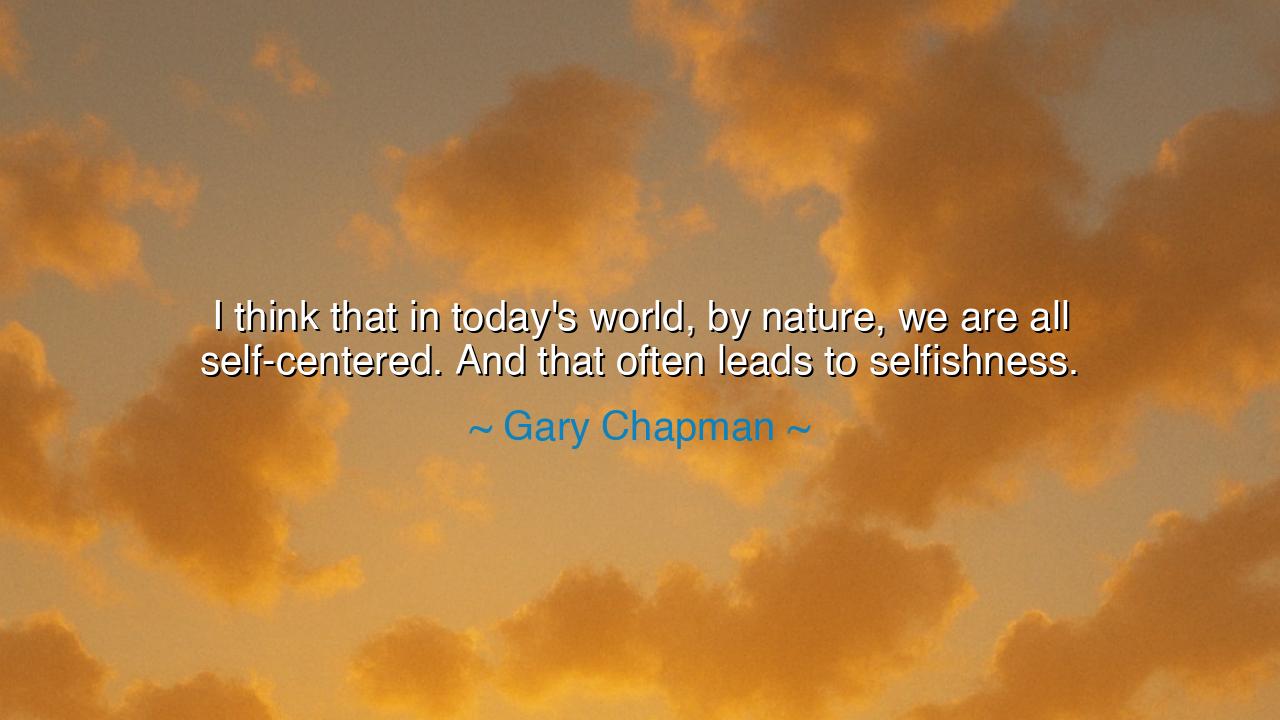
I think that in today's world, by nature, we are all
I think that in today's world, by nature, we are all self-centered. And that often leads to selfishness.






Gary Chapman, the wise counselor of hearts, speaks with simple yet piercing clarity when he says: “I think that in today’s world, by nature, we are all self-centered. And that often leads to selfishness.” These words remind us of an ancient truth: that the root of discord in human life is not in the heavens above, nor in the earth beneath, but in the small throne we build within ourselves — the self, demanding always to be served. When that throne rules unchecked, it breeds selfishness, which corrodes relationships, communities, and even nations.
The meaning of Chapman’s words lies in his recognition that self-centeredness is the natural state of man. From birth, we cry for food, for comfort, for attention. This is not evil in itself, but instinct. Yet as we grow, if we do not discipline this instinct, it hardens into selfishness — a life where others are seen not as souls but as tools, obstacles, or shadows. Chapman warns that the modern age, with its culture of consumption and constant praise of the individual, magnifies this tendency until it blinds us to the greater truth: that joy is found not in self-seeking but in self-giving.
History gives us countless lessons of this. Consider the fall of Napoleon Bonaparte, who rose on the wings of genius and ambition but was undone by the relentless pursuit of self-glory. His campaigns began with the promise of freedom but ended in oceans of blood, for his self-centered vision became selfish conquest, disregarding the lives of millions. Contrast this with the life of Mahatma Gandhi, who set aside his own comfort and devoted himself to the service of his people. One man’s selfishness destroyed empires; another’s selflessness lifted a nation.
Even in the quiet realm of family, this truth resounds. Chapman, known for his teachings on love and relationships, saw that marriages and friendships often wither not from cruelty but from neglect, when each person thinks first of their own desires. A husband who seeks only to be understood, but does not strive to understand; a wife who seeks only to be cherished, but does not seek to cherish — both fall into the trap of selfishness. Where self-centeredness reigns, love becomes conditional and fragile.
The origin of Chapman’s wisdom is both spiritual and practical. Rooted in the teachings of faith, he recalls the ancient command to “love your neighbor as yourself.” But he also speaks from years of listening to broken hearts, where patterns of self-centeredness revealed themselves again and again. His insight is not theoretical, but forged in the furnace of human experience, where he saw how selfishness devours trust and dims the light of love.
The lesson for future generations is urgent: guard against the slow creep of self-centeredness. It enters not only through grand ambitions but through small daily choices: speaking more than listening, taking more than giving, desiring to be served more than to serve. To overcome it, one must cultivate habits of empathy and compassion — asking, “What does the other need? How can I give, not just receive?” In this reversal lies freedom, for in losing ourselves, we find the deeper joy of connection.
Practical action is simple yet demanding. Practice selflessness in small deeds: listen attentively to one who speaks, offer help without waiting to be asked, give gratitude even when it is not required. Let each day be marked by one conscious act of putting another before yourself. Over time, these seeds grow into a character strong enough to resist the weight of selfishness. And when such character spreads from one person to another, it strengthens families, communities, and even nations.
So remember, O seeker: to be human is to be tempted by the pull of the self. But to be noble, to be wise, is to rise beyond it. Choose each day whether you will live only for yourself or for the greater good. For selfishness is the chain that binds, but selflessness is the key that sets the soul free. And in that freedom, the heart discovers its truest nature: not to grasp, but to give.






AAdministratorAdministrator
Welcome, honored guests. Please leave a comment, we will respond soon